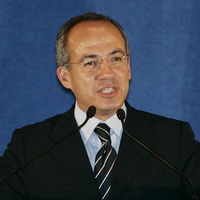Mexico to reorganize training of all state and federal police chiefs
Mexico would overhaul training of all state and federal police chiefs Thursday as it seeks international help to fight organized crime.

Authorities recently removed the nation's top federal police officers and are forcing them to prove they will not be corrupted by organized crime.
Now, more than 1,000 high-ranking state and federal officers will be required to complete a yearlong course in crisis control, law enforcement techniques and the English language - as Mexico aims to work closely with U.S. and European police - said Genaro Garcia Luna, secretary of public safety.
The courses begin Aug. 13 and will be taught partly by experts from the United States, Canada, Germany, France and Spain.
"For the first time in the history of (Mexico's) police, all new chiefs ... will be selected and trained using a uniform criteria that meets international standards," Garcia Luna said.
"Putting the best police Mexico has" in the top posts is the only way to succeed at combating organized crime, he said.
On Monday, Garcia Luna announced that 284 top federal officers would be forced to undergo a "trust test" to remain on the job, an extreme measure to guarantee the honesty of the country's high-ranking police.
The screening, which will be conducted periodically throughout officers' careers, includes anti-doping exams, polygraphs and psychological reviews. It also investigates acquaintances, friends and family, and checks on whether an officer's assets are in line with earnings.
Mexico's police forces have been rife with officers working for the drug cartels.
All participants in the yearlong course first must pass the screening and those who fail polygraph and anti-doping exams will be let go, Garcia Luna said.
The measures are part of a new strategy by the Mexican government to rehabilitate police rather than simply boot them.
In the past, authorities have often purged police forces in attempts to eliminate corruption, only to see many of the fired officers go to work full time for organized crime - or to find work with other police agencies due to poor information-sharing.
Garcia Luna said Mexico wants to strengthen ties with police in Colombia, the United States and especially Europe, which has seen an increase in drugs from Latin America.
Mexico is seeking more U.S. aid in a nationwide crackdown on drug gangs, and Washington has long complained about corruption hindering anti-smuggling efforts in Mexico.
But Garcia Luna says the overhaul is in response to Mexicans' own frustration with crime and corruption, and has nothing to do with U.S. pressure.
Since taking office in December, President Felipe Calderon has sent 24,000 troops to regions plagued by drug gangs, which have been linked to more than 1,300 deaths so far this year.
Early Thursday, a 44-year-old woman was gunned down at a Cancun residence and her body was left with a message from alleged drug traffickers, police said. The death appeared to be a settling of accounts between gangs, authorities said.
In April, the government of the northern state of Nuevo Leon arrested 141 state officers, accusing them of working for the powerful Gulf cartel along the Texas border. And in Tijuana earlier this year, soldiers patrolled the streets while local police were disarmed following accusations they protected smugglers.
Subscribe to Pravda.Ru Telegram channel, Facebook, RSS!





